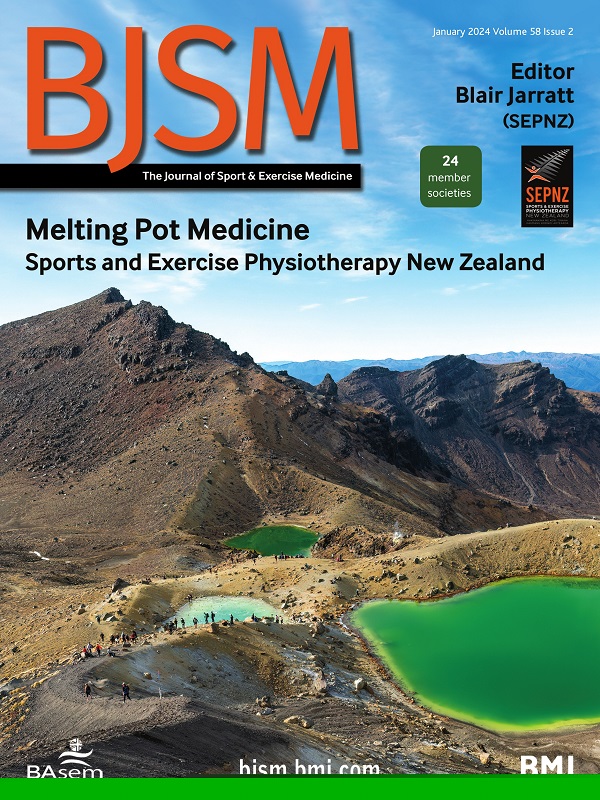Effectiveness of exercise for improving cognition, memory and executive function: a systematic umbrella review and meta-meta-analysis
IF 11.6
1区 医学
Q1 SPORT SCIENCES
引用次数: 0
Abstract
Objective To evaluate systematic reviews of randomised controlled trials (RCTs) on the effects of exercise on general cognition, memory and executive function across all populations and ages. Methods Systematic reviews and meta-analyses of RCTs evaluating the effects of exercise on general cognition, memory and executive function were eligible. Data extraction and risk of bias scoring were conducted in duplicate. The A MeaSurement Tool to Assess systematic Reviews (AMSTAR-2) was used to assess the risk of bias. Effect sizes were pooled using random effects models and reported as standardised mean differences (SMD). Subgroup analyses were conducted for participant and intervention characteristics. General cognition, memory and executive function. Data sources CINAHL, The Cochrane Library, Embase, MEDLINE via OVID, Emcare, ProQuest Central, ProQuest Nursing and Allied Health Source, PsycINFO, Scopus, Sport Discus and Web of Science. Results 133 systematic reviews (2,724 RCTs and 258 279 participants) were included. Exercise significantly improved general cognition (SMD=0.42), memory (SMD=0.26) and executive function (SMD=0.24). Memory and executive function improvements from exercise were greater for children and adolescents than for adults and older adults. Those with attention-deficit/hyperactivity disorder exhibited greater improvement in executive function than other populations. Effects were generally larger for low- and moderate-intensity interventions. Shorter interventions (1–3 months) and exergames (video games that require physical movement) had the largest effects on general cognition and memory. Findings remained statistically significant after excluding reviews rated as low and critically low quality. Conclusions These findings provide strong evidence that exercise, even light intensity, benefits general cognition, memory and executive function across all populations, reinforcing exercise as an essential, inclusive recommendation for optimising cognitive health. Trial registration number PROSPERO ID: CRD42023468991. All data relevant to the study are included in the article or uploaded as supplementary information. All data generated or analysed during this study are included in this published article and its supplementary information files.运动对改善认知、记忆和执行功能的有效性:一项系统的综述和元-元分析
目的评价随机对照试验(RCTs)对所有人群和年龄的运动对一般认知、记忆和执行功能影响的系统评价。方法对评价运动对一般认知、记忆和执行功能影响的随机对照试验进行系统综述和meta分析。数据提取和偏倚风险评分一式两份。评估系统评价的测量工具(AMSTAR-2)用于评估偏倚风险。使用随机效应模型汇总效应大小,并以标准化平均差异(SMD)报告。对参与者和干预特征进行亚组分析。一般认知,记忆和执行功能。数据来源CINAHL, Cochrane图书馆,Embase, MEDLINE通过OVID, Emcare, ProQuest Central, ProQuest Nursing and Allied Health Source, PsycINFO, Scopus, Sport Discus和Web of Science。结果共纳入133项系统评价(2,724项随机对照试验,258 279名受试者)。运动显著改善一般认知(SMD=0.42)、记忆(SMD=0.26)和执行功能(SMD=0.24)。与成年人和老年人相比,儿童和青少年的记忆力和执行功能的改善更大。那些患有注意力缺陷/多动障碍的人在执行功能上比其他人表现出更大的改善。一般来说,低强度和中等强度的干预效果更大。较短的干预(1-3个月)和exergame(需要身体运动的电子游戏)对一般认知和记忆的影响最大。排除低质量评价和极低质量评价后,研究结果仍然具有统计学意义。这些发现提供了强有力的证据,证明运动,即使是低强度的运动,也有益于所有人群的一般认知、记忆和执行功能,从而加强了运动作为优化认知健康的必要、包容性建议。试验注册号PROSPERO ID: CRD42023468991。所有与研究相关的数据都包含在文章中或作为补充信息上传。本研究过程中产生或分析的所有数据都包含在这篇发表的文章及其补充信息文件中。
本文章由计算机程序翻译,如有差异,请以英文原文为准。
求助全文
约1分钟内获得全文
求助全文
来源期刊
CiteScore
27.10
自引率
4.90%
发文量
217
审稿时长
3-8 weeks
期刊介绍:
The British Journal of Sports Medicine (BJSM) is a dynamic platform that presents groundbreaking research, thought-provoking reviews, and meaningful discussions on sport and exercise medicine. Our focus encompasses various clinically-relevant aspects such as physiotherapy, physical therapy, and rehabilitation. With an aim to foster innovation, education, and knowledge translation, we strive to bridge the gap between research and practical implementation in the field. Our multi-media approach, including web, print, video, and audio resources, along with our active presence on social media, connects a global community of healthcare professionals dedicated to treating active individuals.

 求助内容:
求助内容: 应助结果提醒方式:
应助结果提醒方式:


